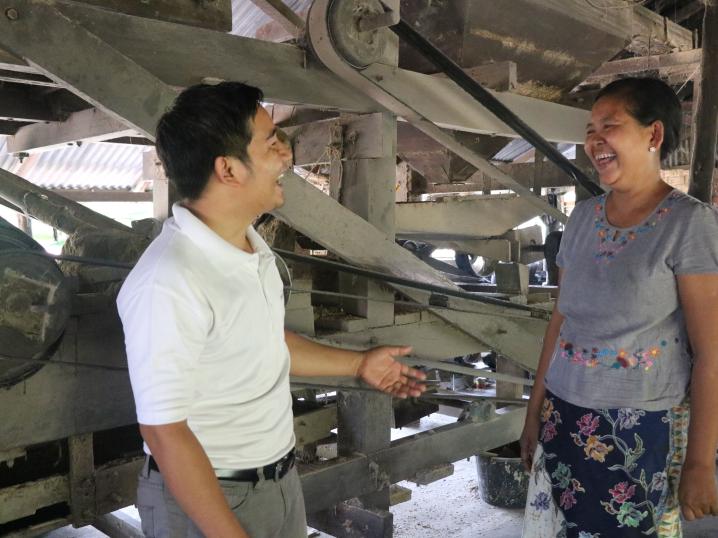Not So Run Of The Mill

Daw Saw Saw Win, like many women in Myanmar, left her family to move to Yangon, the capital city for work where she took on various jobs in tourism, hotels, and in government offices. She did this to support her three children, one is 21 and studying in the university, the second is 17 and finishing high school and the youngest is 15 and in grade 10. When her mother passed away, Daw had to return to Hpa-an to manage their family’s business. Together with her brother, they ran a rice milling and wholesale business. Taking on this responsibility was not easy, nor was maintaining and growing the newly inherited business.
Their rice mill plays a crucial role in her community’s economy. The mill supports her and her brother’s family and their six employees, all of whom have children of their own. The business buys rice from farmers in about 50 villages, threshes it in the machine, bags up the processed rice and then sells it. In some cases, they give farmers money in advance to help them with upfront costs/expenses of rice farming, and then they will collect the harvest when it is ready. They also provide fertiliser to the farmer if they need it and then deduct the cost from the price they pay for the rice at harvest time.
Daw Saw Saw Win and her brother have 15 regular customers. On average they process about 100 bags of rice per day, about 3,000 bags in a month. They export the bags to Yangon and Thailand for 10,000 kyat per bag, with each bag weighing 50kg bag once processed. The rice husk, which is a by-product produced in the milling process, is sold to farmers as animal feed.
In the six years since taking over the business Daw has steadily grown the mill production, employs more people and produces more rice. While the business was stable, it didn’t produce much profit. This made it very difficult for the business to expand and left Daw Saw Saw Win and the families and farmers depending on the business, vulnerable to market shocks, natural disasters and other setbacks.
In Myanmar, poor infrastructure, lack of equipment and seasonal rains affect the productivity and income of farmers and producers. For Daw, transportation was a costly item in her business, she often spent a large amount of money renting trucks to transport the rice, so she began to look for opportunities to address this. VisionFund Myanmar’s loan officer put forth the idea of buying a truck. Outlining her plans, she was given two loans, first one for 1,000,000 Kyat (US$650) and then an SGB loan for 10,000,000 Kyat ($6,500).
The truck helped Daw Saw Saw Win as she could pick rice to be milled from the famers and she could deliver to her buyers directly. She was also able to rent the truck out to others when she didn’t need it. She estimates the better service, the savings and extra income from the truck and loan has grown their profits 300%.
Daw sees another opportunity which will grow the rice mill business and provide livelihoods for others in her community. She is planning to purchase another threshing machine which would double the capacity of their mill. This would employ an additional 5-6 people and free up her brother to focus on upgrading the quality of the rice they produce. Importantly, with better and higher quality rice she has the potential to access export markets. She would be able to sell more rice to buyers in Thailand and possibly also begin to export rice to China. With the ongoing support of VisionFund, her family’s business has provided for her and her family, as well as those in their community.
Daw Saw Saw Win is very satisfied with VisionFund Myanmar’s services and feels lucky to have a chance to get a loan and a relationship with VFM. She highlighted how easy it was to get the financing, how easy it was to talk with the loan officer and discuss the different ideas that they had.